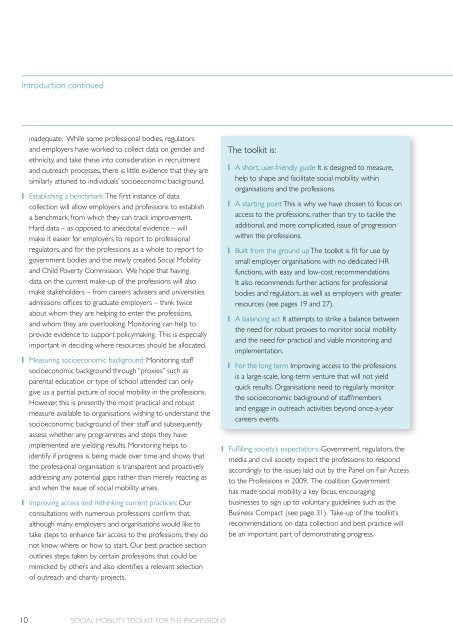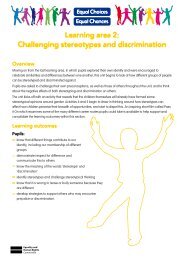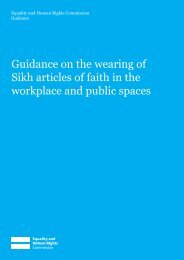Social Mobility Toolkit for the Professions - Equality and Human ...
Social Mobility Toolkit for the Professions - Equality and Human ...
Social Mobility Toolkit for the Professions - Equality and Human ...
Create successful ePaper yourself
Turn your PDF publications into a flip-book with our unique Google optimized e-Paper software.
introduction continued<br />
inadequate. While some professional bodies, regulators<br />
<strong>and</strong> employers have worked to collect data on gender <strong>and</strong><br />
ethnicity, <strong>and</strong> take <strong>the</strong>se into consideration in recruitment<br />
<strong>and</strong> outreach processes, <strong>the</strong>re is little evidence that <strong>the</strong>y are<br />
similarly attuned to individuals’ socioeconomic background.<br />
� establishing a benchmark: <strong>the</strong> first instance of data<br />
collection will allow employers <strong>and</strong> professions to establish<br />
a benchmark, from which <strong>the</strong>y can track improvement.<br />
hard data – as opposed to anecdotal evidence – will<br />
make it easier <strong>for</strong> employers to report to professional<br />
regulators, <strong>and</strong> <strong>for</strong> <strong>the</strong> professions as a whole to report to<br />
government bodies <strong>and</strong> <strong>the</strong> newly created <strong>Social</strong> <strong>Mobility</strong><br />
<strong>and</strong> child poverty commission. We hope that having<br />
data on <strong>the</strong> current make-up of <strong>the</strong> professions will also<br />
make stakeholders – from careers advisers <strong>and</strong> universities<br />
admissions offices to graduate employers – think twice<br />
about whom <strong>the</strong>y are helping to enter <strong>the</strong> professions,<br />
<strong>and</strong> whom <strong>the</strong>y are overlooking. Monitoring can help to<br />
provide evidence to support policymaking. this is especially<br />
important in deciding where resources should be allocated.<br />
� Measuring socioeconomic background: Monitoring staff<br />
socioeconomic background through “proxies” such as<br />
parental education or type of school attended can only<br />
give us a partial picture of social mobility in <strong>the</strong> professions.<br />
however, this is presently <strong>the</strong> most practical <strong>and</strong> robust<br />
measure available to organisations wishing to underst<strong>and</strong> <strong>the</strong><br />
socioeconomic background of <strong>the</strong>ir staff <strong>and</strong> subsequently<br />
assess whe<strong>the</strong>r any programmes <strong>and</strong> steps <strong>the</strong>y have<br />
implemented are yielding results. Monitoring helps to<br />
identify if progress is being made over time <strong>and</strong> shows that<br />
<strong>the</strong> professional organisation is transparent <strong>and</strong> proactively<br />
addressing any potential gaps ra<strong>the</strong>r than merely reacting as<br />
<strong>and</strong> when <strong>the</strong> issue of social mobility arises.<br />
� improving access <strong>and</strong> rethinking current practices: our<br />
consultations with numerous professions confirm that,<br />
although many employers <strong>and</strong> organisations would like to<br />
take steps to enhance fair access to <strong>the</strong> professions, <strong>the</strong>y do<br />
not know where or how to start. our best practice section<br />
outlines steps taken by certain professions that could be<br />
mimicked by o<strong>the</strong>rs <strong>and</strong> also identifies a relevant selection<br />
of outreach <strong>and</strong> charity projects.<br />
10 <strong>Social</strong> <strong>Mobility</strong> toolkit For <strong>the</strong> proFeSSionS<br />
<strong>the</strong> toolkit is:<br />
� a short, user-friendly guide it is designed to measure,<br />
help to shape <strong>and</strong> facilitate social mobility within<br />
organisations <strong>and</strong> <strong>the</strong> professions.<br />
� a starting point this is why we have chosen to focus on<br />
access to <strong>the</strong> professions, ra<strong>the</strong>r than try to tackle <strong>the</strong><br />
additional, <strong>and</strong> more complicated, issue of progression<br />
within <strong>the</strong> professions.<br />
� built from <strong>the</strong> ground up <strong>the</strong> toolkit is fit <strong>for</strong> use by<br />
small employer organisations with no dedicated hr<br />
functions, with easy <strong>and</strong> low-cost recommendations.<br />
it also recommends fur<strong>the</strong>r actions <strong>for</strong> professional<br />
bodies <strong>and</strong> regulators, as well as employers with greater<br />
resources (see pages 19 <strong>and</strong> 27).<br />
� a balancing act it attempts to strike a balance between<br />
<strong>the</strong> need <strong>for</strong> robust proxies to monitor social mobility<br />
<strong>and</strong> <strong>the</strong> need <strong>for</strong> practical <strong>and</strong> viable monitoring <strong>and</strong><br />
implementation.<br />
� For <strong>the</strong> long term improving access to <strong>the</strong> professions<br />
is a large-scale, long-term venture that will not yield<br />
quick results. organisations need to regularly monitor<br />
<strong>the</strong> socioeconomic background of staff/members<br />
<strong>and</strong> engage in outreach activities beyond once-a-year<br />
careers events.<br />
� Fulfilling society’s expectations: Government, regulators, <strong>the</strong><br />
media <strong>and</strong> civil society expect <strong>the</strong> professions to respond<br />
accordingly to <strong>the</strong> issues laid out by <strong>the</strong> panel on Fair access<br />
to <strong>the</strong> professions in 2009. <strong>the</strong> coalition Government<br />
has made social mobility a key focus, encouraging<br />
businesses to sign up to voluntary guidelines such as <strong>the</strong><br />
business compact (see page 31). take-up of <strong>the</strong> toolkit’s<br />
recommendations on data collection <strong>and</strong> best practice will<br />
be an important part of demonstrating progress.












